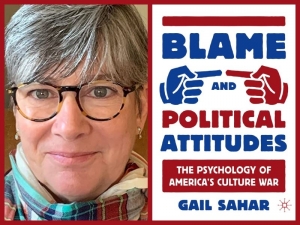In today’s politically charged landscape, the themes of blame and understanding drive critical discussions about our society. In this episode of Listen Up Podcast, we delve into the fascinating insights shared by Dr. Gayle Sahar, a professor of psychology at Wheaton College and author of “Blame and Political Attitudes: The Psychology of America’s Cultural Wars.” This riveting dialogue touches on crucial topics such as the psychology behind our emotional responses to social issues, the trend of polarization, and the unconscious biases that influence our attitudes toward others.
Throughout the conversation, Dr. Sahar emphasizes the vital connection between how people perceive the causes of social problems and how that shapes their emotional responses and subsequent behaviors. For instance, when we encounter homelessness, our instinct is often to rationalize the situation. Are we justified in our sympathy or anger based on what we believe are the causes? She illustrates how labeling people as “lazy” or “irresponsible” can lead to a lack of empathy and support for government assistance programs. In contrast, thoughts framed in societal contexts—like systemic issues that hinder opportunities—can cultivate a more compassionate perspective and an inclination to help others.
Dr. Sahar discusses a notable case, examining the Daniel Penny incident where a conflict involving a homeless individual escalated. She highlights the polarized interpretations surrounding it, where conservatives may view it as justifiable self-defense while liberals advocate for the poor man’s struggles and mental health issues. This divergence underscores how biases corresponding to political ideologies can significantly impact our judgments and emotions.
One of the most profound sections of the podcast relates to the interplay between blame and the complex issues of race and sexuality in America. Dr. Sahar explains how blame is often allocated differently based on race, affecting public attitudes and responses to various social issues. Evidence suggests that people are remarkably more likely to blame Black individuals for committing crimes compared to their white counterparts for similar offenses. Additionally, perceptions surrounding sexual assault, abortion, and attitudes towards homosexuality are explored, revealing uncomfortable truths about societal judgments and victim-blaming mentalities.
This journey into the subconscious processing of blame also touches on the larger implications for American society. Dr. Sahar suggests that a significant challenge is overcoming societal narratives pushed by media and politicians which consistently amplify divisions rather than foster understanding. The podcast reflects on how a considerable segment of the American populace may not be as polarized as it appears; many individuals hold moderate views yet feel unheard amidst stark ideological divides. The need to address the overwhelming implications of corporate interests and how they influence political attitudes is another vital point of discussion, illustrating how socio-economic factors complicate the narrative of blame further.
Dr. Sahar expresses a sense of optimism, arguing that awareness of how we assign blame can foster empathy—a view hopeful in an era of divisiveness. Simple interventions, like cognitive simulations to encourage understanding the plight of the poor, can shift public perspectives, showing that many are willing to reconsider their views.
In closing, the podcast resonates with anyone grappling with feelings of frustration amid societal turmoil. With calls for compassion and the need for critical thinking, Dr. Sahar leaves us contemplating how our understanding—or misunderstanding—of blame might help shape a better narrative tomorrow.


